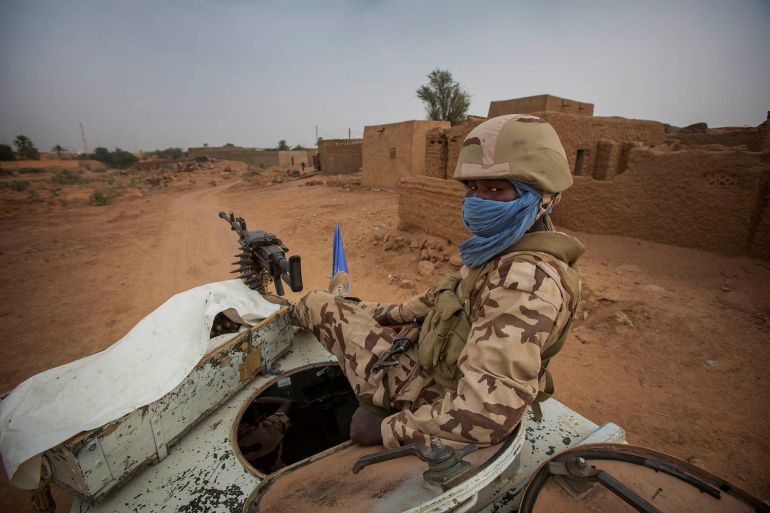Mali asks UN to withdraw its peacekeeping mission ‘without delay’
The West African nation’s military rulers criticised MINUSMA’s ‘failure’ to respond to security challenges.

Mali has called on the United Nations to withdraw its peacekeeping mission from the country “without delay,” denouncing its “failure” to respond to security challenges.
Foreign Minister Abdoulaye Diop, who is part of Mali’s interim military authorities, told a UN Security Council meeting on Friday that the peacekeeping force known as MINUSMA should withdraw its troops from the West African nation.
Keep reading
list of 4 itemsDiscarded mortar detonates killing more than 20 in Somalia: Media
Six killed in al-Shabab attack on Mogadishu hotel
One UN peacekeeper dead, four others injured in north Mali attack
El Ghassim Wane, the head of the UN mission in Mali, said after the meeting of the 15-member council that conducting UN peacekeeping operations was “nearly impossible” without the consent of the host country.
“It’s a decision that the council has to make,” he told reporters. “But the point I’m making, and I believe it’s a point that everyone agrees on, is that peacekeeping is based on the principle of consent from the host country and absent that consent, of course, operations are nearly impossible.”
Al Jazeera’s Kristen Saloomey said that the mandate for the mission is due to expire at the end of the month.
“The foreign minister had expressed concern that the UN had been in the country for 10 years and the violence and insecurity it was sent there to stop had only gotten worse,” she said, reporting from UN headquarters in New York City.
“He said this has resulted in a crisis of confidence for the Malian people. There have been protests in Mali calling on UN peacekeepers to leave.”
UN Security Council members must adopt a resolution to extend MINUSMA’s mandate by June 30. That requires at least nine votes in favour and no vetoes by Russia, China, the United States, United Kingdom or France to pass.
Russia’s UN Ambassador Vassily Nebenzia told the council that the peacekeeping mission could only be successful if there was “very close coordination with the host country and respect for sovereignty of Mali”.
“The real issue is not the number of peacekeepers but the functions, and one of the key tasks for the government of Mali is fighting terrorism, which is not provided for in the mandate of the blue helmets,” Nebenzia said.
The country’s military rulers have increasingly imposed operational restrictions on peacekeepers and also broke Mali’s longstanding alliance with former colonial power France.
“The government of Mali calls for the withdrawal without delay of MINUSMA,” said Diop.
“However, the government is willing to cooperate with the United Nations on this issue,” he added, rejecting all options for changing the mandate of the mission as proposed by the UN secretary-general.
In January, UN chief Antonio Guterres put forward three options for amending the mission, from an increase in personnel to a withdrawal of troops.
In a report published at the beginning of the week, he recommended an intermediate solution to the UN Security Council to “reconfigure” the operation to concentrate on a limited number of priorities.
More than 300 peacekeepers have been killed since the start of the mission in 2013, making it the deadliest UN mission in the world.
MINUSMA was set up to help stabilise the country after a Tuareg rebellion the previous year that gave rise to a continuing rebellion. While rebels were forced from power in Mali’s northern cities with the help of a French-led military operation, they regrouped in the desert and began launching attacks on the Malian army and its allies.
Frustrations about the growing insecurity led to two coups in Mali in 2020 and 2021 and the ruling military government has been increasingly at loggerheads with MINUSMA and other international allies, including France.
“MINUSMA seems to have become part of the problem by fuelling community tensions exacerbated by extremely serious allegations which are highly detrimental to peace, reconciliation and national cohesion in Mali,” said Diop.
“This situation generates a feeling of distrust among the populations with regard to MINUSMA,” he added, noting a recent damning report by the UN High Commissioner for Human Rights on an anti-rebel operation in Moura in March 2022.
The demand comes at a time when the country is preparing for elections on Sunday.
Malians will vote to approve or reject constitutional amendments that would reinforce presidential powers before a promised transition from military rule back to democracy.
The referendum is the first in a series of scheduled polls meant to pave the way for presidential elections in February 2024, which Mali’s military leaders committed to hold following pressure from regional powers.